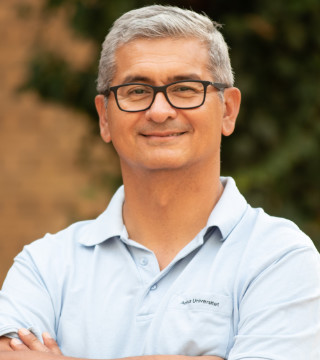Meet Eduardo Castrillon
Empowering oral health professionals to play an essential role in dental sleep medicine
How can we use our knowledge of oral physiology to help unveil the mechanisms involved in dental sleep disorders and better the lives of millions of people? This is a fundamental quest for Associated Professor Eduardo Castrillon, born in 1969.
It is said that we are asleep close to 33 % of our lives. If we live to become 80 years old, we will spend more than 26 years sleeping. Since sleep is known to be vital to almost every process in the body, its disturbance can affect our physical and mental function, our capacity to heal from a disease, our immunity, and our metabolism increasing the risk of developing chronic illness.
“In modern life, we tend to sacrifice sleep to gain more time, but what we may actually be doing is to make our lives shorter. My research interest is dental sleep medicine, which among other health problems includes obstructive sleep apnea, bruxism, and orofacial pain. Problems that can potentially disturb one-third of your lifetime,” says Eduardo Castrillon.
Eighteen years ago, he immigrated to Denmark from Peru to pursue an academic career. Eduardo Castrillon obtained a Ph.D. with his research on clinical orofacial muscle pain physiology; he expanded his research field towards bruxism (clenching and grinding teeth) and obstructive sleep apnea (OSA). This led him to develop an interest in sleep disorders that may originate from or affect oral health.
According to Eduardo Castrillon, one in seven adults worldwide is affected by OSA, and most of them are undiagnosed and untreated, which can lead to significant comorbidities and mortality at great cost to society and the individual.
He explains that OSA is an area where oral health professionals can provide one of the possible treatments to manage this severe health issue. This treatment is called Mandibular Advancement Device (MAD) or ‘snorke-skinnen’, and Eduardo Castrillon is part of the research group that has recently demonstrated that the MAD treatment is not merely a mechanical intervention but may have physiological implications in the brain motor skill control in OSA patients.
“Oral health professionals are part of the multidisciplinary team that can help decrease the severe health complication that may arise from OSA. We can provide new scientific evidence-based information and tools to help identify OSA and deliver appropriate treatment when indicated. Due to the clinical experience and understanding of orofacial physiology, oral health professionals should play an essential role in the OSA field because we have and can generate a broader knowledge in dental sleep medicine,” he states.
Empowering oral health professionals to play an essential role in identifying and managing OSA and other dental sleep disorders is still a driving force for Eduardo Castrillon’s research.
“I am delighted to be part of one of the top dental schools in the world, and I am thrilled and excited to keep learning. I hope to contribute to the scientific world with new knowledge and development of clinical procedures in dental sleep medicine.”
